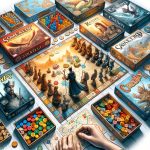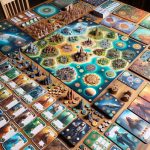Are you looking to elevate your board game skills and dominate your next game night? Look no further than this comprehensive guide to board games strategy. Whether you’re a casual player or a seasoned veteran, understanding and implementing strategic thinking is essential for success in many board games.
In this article, we’ll delve into the world of board games strategy, exploring the different types of games that require strategic thinking, key elements of a successful strategy, practical tips for developing winning strategies, and much more. Get ready to take your gaming to the next level with our expert advice on board games strategy.
The world of board games is vast and varied, encompassing a wide range of game genres that appeal to players of all ages and skill levels. From Eurogames to war games to abstract strategy games, each type offers its own unique challenges and opportunities for strategic thinking.
Understanding the importance of strategy can enhance not only your chances of winning but also the overall enjoyment of the gaming experience. Whether you prefer competitive head-to-head matchups or cooperative gameplay, having a solid grasp of strategic thinking will undoubtedly make you a more formidable opponent at the game table.
In this article, we’ll break down the key elements of a successful board game strategy, including planning, adaptability, and risk assessment. We’ll also provide practical tips for developing a winning strategy, offering advice on how to improve your strategic thinking and decision-making skills in board games.
Additionally, we’ll highlight popular board games that heavily focus on strategy such as Settlers of Catan, Ticket to Ride, and Pandemic – giving you specific examples to analyze and draw inspiration from as you work on enhancing your own gaming tactics. So whether you’re new to strategic gameplay or looking to take your skills up a notch, this article has something for players at every level.
Types of Board Games
When it comes to board games, strategic thinking is a crucial element that can greatly enhance the overall gaming experience. Understanding the different types of board games that require strategic thinking can help players develop their skills and enjoy the game more fully. Here are some popular categories of board games that emphasize strategy:
- Eurogames: Also known as German-style board games, Eurogames are characterized by their emphasis on strategy, minimal luck, and player interaction. Games like Settlers of Catan and Carcassonne fall into this category, requiring players to think ahead and adapt their strategies based on changing game conditions.
- War Games: War games simulate historical or fictional battles, and often require careful planning, resource management, and tactical decision-making. These games allow players to strategize on a larger scale, considering not only their own moves but also anticipating those of their opponents. Examples include Risk and Axis & Allies.
- Abstract Strategy Games: Abstract strategy games focus purely on strategic reasoning and do not rely on luck or theme. In these games, such as Chess or Go, players must carefully consider every move and anticipate potential consequences several steps ahead in order to outmaneuver their opponent.
Each of these categories offers a unique way for players to engage with board games strategy while providing different challenges and opportunities for strategic thinking. Whether you prefer the resource management aspect of Eurogames, the long-term planning involved in war games, or the pure mental challenge of abstract strategy games, there’s something for every strategic thinker in the world of board gaming.
By exploring these different categories, players can broaden their understanding of strategy and develop adaptable skills that can be applied across various types of board games.
Key Elements of Strategy
Strategic thinking is a crucial aspect of playing board games, as it can greatly influence the outcome of the game and enhance the overall gaming experience. When developing a successful board game strategy, several key elements must be taken into consideration. Planning, adaptability, and risk assessment are essential components that can significantly impact a player’s performance in various board games.
Planning plays a vital role in board games strategy, as it involves setting short-term and long-term goals while considering potential obstacles and opponents’ moves. A well-thought-out plan enables players to make informed decisions and anticipate future developments within the game. Additionally, adaptability is critical in adjusting strategies based on evolving circumstances during gameplay.
Being flexible and responsive to changing conditions allows players to maintain a competitive edge and overcome unexpected challenges. Furthermore, risk assessment involves evaluating potential gains versus losses when making strategic choices in board games. It requires careful consideration of probabilities, consequences, and potential repercussions to create an effective game plan.
In many board games such as Settlers of Catan, Ticket to Ride, or Pandemic, mastering these key elements of strategy can significantly improve a player’s chances of success. Understanding how to effectively plan ahead, adapt to changing game dynamics and assess risks can make the difference between victory and defeat.
| Board Game | Key Strategy Elements |
|---|---|
| Settlers of Catan | Planning, Adaptability |
| Ticket to Ride | Adaptability, Risk Assessment |
| Pandemic | Planning, Risk Assessment |
Tips for Developing a Winning Strategy
Board games strategy is essential for achieving success and enhancing the overall gaming experience. Developing a winning strategy involves planning, adaptability, and risk assessment. To improve strategic thinking and decision-making skills in board games, here are some practical tips to consider.
Firstly, it’s important to understand the rules and mechanics of the game thoroughly. Knowing how each component works and interacts with others will help in making informed decisions during gameplay. Additionally, observing other players’ strategies can provide valuable insights into different approaches and tactics that can be used to one’s advantage.
Furthermore, honing decision-making skills is crucial when it comes to board games strategy. Evaluating all available options and considering the potential outcomes of each decision can greatly impact the overall game. Being able to assess risks and benefits effectively will lead to more successful gameplay.
Lastly, practice makes perfect when it comes to developing a winning strategy in board games. The more experience a player gains, the better they will become at identifying effective strategies and understanding the nuances of different games.
| Practical Tips | Description |
|---|---|
| Understand Game Rules | Thorough understanding of game mechanics |
| Hone Decision-Making Skills | Evaluate options effectively |
| Practice Regularly | Improvement through experience |
Popular Board Games for Strategy
When it comes to board games, strategy is often a key component of a successful gameplay experience. Players must use their critical thinking skills and decision-making abilities to outsmart their opponents and achieve victory. There are several popular board games that are heavily focused on strategy, providing players with the opportunity to craft intricate plans and make tactical moves to secure a win.
Some well-known board games that emphasize strategic thinking include:
- Settlers of Catan: This iconic Eurogame requires players to gather resources, build settlements, and establish trade routes in order to dominate the island of Catan. A carefully crafted strategy is crucial for success in this game, as players compete for limited resources and vie for control of key locations on the map.
- Ticket to Ride: In this railway-themed board game, players must strategically claim train routes across the country while completing specific destination tickets. Planning ahead is essential as players navigate through different obstacles and attempt to sabotage their opponents’ plans.
- Pandemic: As players work together as a team to stop the spread of global diseases, strategic planning and coordination are vital. Each player takes on a unique role with special abilities, making it essential to communicate effectively and adapt their strategies in response to new challenges.
These board games offer immersive experiences that challenge players’ analytical skills and provide endless opportunities for strategic decision-making. Whether navigating resource management in Settlers of Catan or coordinating efforts in Pandemic, these games provide an engaging platform for honing one’s board game strategy skills.
Advanced Strategy Techniques
Bluffing
Bluffing is a well-known strategy in board games that involves deceiving opponents into believing something that is not true. This technique can be especially effective in games that involve hidden information or negotiation, such as poker or social deduction games.
Bluffing requires a great deal of confidence and the ability to maintain a straight face even when lying to other players. It is important to use this strategy sparingly, as overuse can lead to loss of credibility and make it difficult to bluff successfully in future game sessions.
Misdirection
Misdirection is another advanced strategy that involves leading opponents to believe you are pursuing a particular objective while secretly working towards a different goal. This tactic is often used in games with multiple paths to victory, such as area control or resource management games.
By creating the illusion of focusing on one aspect of the game, players can catch their opponents off guard and secure their victory through an unexpected route. However, misdirection requires careful planning and the ability to adapt if opponents begin to see through the ruse.
Long-Term Planning
Long-term planning is a crucial strategy for experienced board game players who are able to think several turns ahead and envision how their decisions will impact future outcomes. This approach is most commonly employed in complex strategy games with extensive decision trees, such as 4X (explore, expand, exploit, exterminate) games or economic simulators.
Long-term planning involves setting clear objectives early in the game and making strategic choices that will lay the groundwork for success in later stages. Patience and foresight are essential for executing this strategy effectively.
Overall, mastering advanced strategy techniques like bluffing, misdirection, and long-term planning can elevate a player’s performance in board games and open up new avenues for creative gameplay and deeper immersion in strategic decision-making processes.
The Psychology of Board Game Strategy
When it comes to board games strategy, it’s not just about the game pieces and the rules. A significant aspect of strategy in board games involves understanding the psychological aspects of gameplay. This includes reading opponents, predicting their moves, and using that knowledge to your advantage. Mastering these psychological elements can be the key to success in many board games.
Reading Opponents
One crucial part of board game strategy is being able to read your opponents. This involves paying attention to their behaviors, patterns, and decisions throughout the game. By observing how they play, you can gain insights into their strategic approach and use this information to adjust your own tactics accordingly.
Predicting Their Moves
Another important psychological aspect of strategic gameplay is predicting your opponents’ moves. By understanding their motivations and tendencies, you can anticipate what they might do next. This allows you to plan ahead and make informed decisions based on what you think your opponents will do in response.
Using Psychology to Your Advantage
In addition to reading opponents and predicting their moves, there are also ways to leverage psychology to your advantage during board games. For example, employing bluffing techniques or misdirection can manipulate opponents into making suboptimal decisions based on false assumptions. Understanding the psychological dynamics at play can give you a strategic edge and enhance your chances of winning.
Online Resources for Strategy Improvement
In conclusion, board games strategy is an essential aspect of the gaming experience, adding depth, challenge, and excitement to the gameplay. By understanding the key elements of strategy and practicing advanced techniques, players can enhance their skills and increase their chances of winning. Whether it’s Eurogames, war games, or abstract strategy games, strategic thinking plays a crucial role in achieving success in board games.
Developing a winning board game strategy requires effective planning, adaptability, and risk assessment. It also involves understanding the psychology of strategic gameplay, such as reading opponents and predicting their moves. Fortunately, there are plenty of online resources available for players to improve their strategic thinking, including websites, forums, and online communities where they can learn from others and engage in discussions about board game strategy.
Players looking to sharpen their board game strategy skills can explore popular games that heavily emphasize strategic thinking such as Settlers of Catan, Ticket to Ride, and Pandemic. They can also seek out practical advice on how to improve decision-making skills when playing these types of games.
Additionally, more experienced players can delve into advanced strategies like bluffing, misdirection, and long-term planning to take their gameplay to the next level. With dedication and practice using these resources at their disposal, gamers can elevate their board game strategy skills and ultimately enjoy even more fulfilling gaming experiences.
Frequently Asked Questions
What Is a Strategy Type of Board Game?
A strategy type of board game is a game that requires players to make calculated, tactical decisions in order to achieve victory. These games often involve elements of skill, planning, and foresight in order to outmaneuver opponents.
What Board Game Has the Most Strategy?
The board game that is often considered to have the most strategy is Chess. With its origins dating back centuries, Chess is a game of deep and intricate strategy, requiring players to anticipate their opponent’s moves and plan several steps ahead in order to secure a checkmate.
What Is a Well Known Board Game That Requires Strategy?
A well-known board game that requires strategy is Settlers of Catan. In this game, players compete to build settlements and cities on the island of Catan by gathering resources and trading with one another. Success in Settlers of Catan depends largely on strategic resource management and negotiation with other players.

I love playing all kinds of games – from classics like Monopoly to modern favourites like Ticket to Ride.
I created this blog as a way to share my love of board games with others, and provide information on the latest releases and news in the industry.





